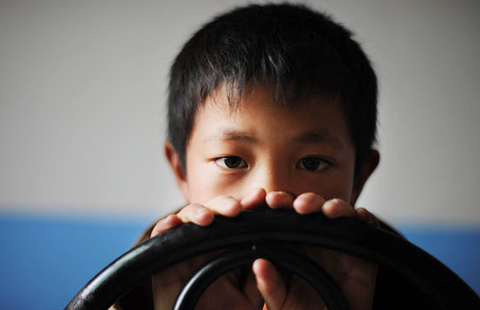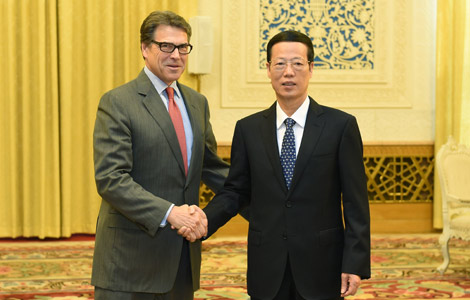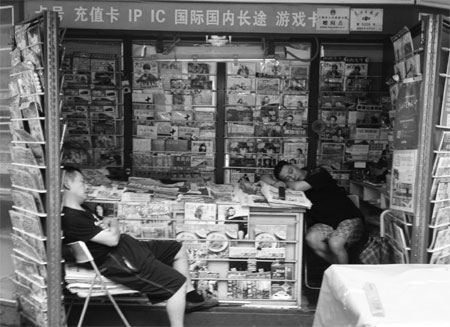Two cases show damage from media corruption
Updated: 2014-09-12 11:26
By Li Yang in Shanghai(China Daily USA)
|
||||||||
Several editors at the Shanghai-based business news website 21cbh.com were detained last week for alleged blackmailing of enterprises. According to the police, a huge amount of money was involved in the case.
Xinhua News Agency's branch in Shanghai "automatically" ended a 3.5 million yuan ($590,000) contract with the Communication Bank of China last week after the central authority's disciplinary inspection team found the contract is actually a disguise for the bank to buy good news or ignorance from the media.
The two cases came after President Xi Jinping vowed to reform the media last month and are believed to be the starting point for the Chinese central authority in dealing with corruption in the media.
Analysts said the two cases are only the tip of media malpractices that have operated as an open secret in the industry or even a lucrative business model.
Three kinds of media corruption prevail in China.
First, as the 21cbh.com case indicates, some editors and reporters, or fake editors and reporters, seek illicit profit from their interviewees, enterprises and governments. In exchange, they can report positive news about the interviewees, or become selectively blind to the interviewees' negative stories.
Many enterprises' public relations budget is spent to muffle the media in cases of scandals and production accidents, or employ the media to trumpet their products and services. Envelopes containing so-called traffic fees are common in many press conferences organized by companies and local governments.
In this process, news reporting becomes a trade of money and publicity. Media loses its public, credibility and independence. The paid reporting is actually a manipulation of public opinion and an abuse of public tools. Money talks at the expense of the public interest and media ethics.
Second, some star reporters have close personal connections with senior officials and big bosses. They are middle men for some underhanded dealings between the officials and the business people. Or, some officials of the powerful monopoly media take advantage of their power to extort bribes.
Last month, several famous anchors, producers and an advertising department head from the China Central Television were investigated for alleged connection to senior graft officials and abuse of power.
Rui Chenggang, a star anchor of business news for CCTV, was found running a public relations company with his family, and most of the company's clients are his interviewees.
Third, as the Xinhua's Shanghai branch case shows, the media's branches in the county, city and province are usually important money makers for their headquarters in Beijing, Shanghai or the provincial capitals.
Although the media administration strictly bans this practice and stipulates media's local branch can only do reporting works, local branches of the big media can find many ways to circumvent the check and auditing of the authority. Making money has been an important task for them for a long time.
Were it not for the central authority's special inspection team, Xinhua's case would not have been exposed, because local governments need to keep good relations with the central media's branches, which are regarded as messengers directly connecting senior leaders.
There are reasons behind this phenomenon.
On one hand, the media administration still relies on government rules and policies to rule the fast changing media industry. The lack of a rule of law makes the rumor makers and blackmailers fearless. Thus, once mastering the media outlets, the media guys acquire a channel to translate the media's influence into personal gains.
Bad money drives out good money. Good media suffers from the lack of rules, but bad ones boom.
On the other hand, some companies and government departments have made mistakes that concern the public interest. But the irresponsible business and administration watchdogs cannot find and address the errors in time. Or, they cannot find the mistakes at all.
It is usually the media that finds the mistakes first and develops them into a scandal or a hot topic. The fastest way to kill reports and sway public opinion in a crisis is to pay the media in the form of an advertising fee.
Many enterprises and governments have the budget of publicity fees to quench the fire started by the media.
The low income of reporters and editors is another important cause for media corruption. The average monthly salary of a journalist working three years in Beijing and Shanghai is about $1,000 to $1,500, an amount far from enough to let them live a decent life.
The problem is even if they work another 10 years as a journalist or editor, their income will not increase as much as it would in other careers.
Some journalism professors called the young reporters and editors journalist migrant workers who usually quit their media jobs after several years. The media has become a training center for other professions.
The police and central authority's inspection team are not enough to address the media's corruption. To some extent, the issue is an intersection of many problems with Chinese society, government and the market.
China should have a Press Law which could be the foundation for carrying out rule of law in media.
As Chinese society becomes more plural, the Chinese media should also play a role as an effective public sphere to reflect the fast-changing society, and provide channels for different interest groups to communicate their opinions.
Without a media ruled by law, it is hard to organize such a responsible public sphere for constructive discussion and communication.
A rule-of-law media landscape not only guarantees the people's right to say and to know, but also creates a fair environment for competition among media.
|
A news stand in Shanghai. Several editors at Shanghai-based business news website 21cbh.com were detained last week for alleged blackmailing of enterprises. Gao Erqiang / China Daily |
(China Daily USA 09/12/2014 page6)

 9/11 victims remembered
9/11 victims remembered
 Americans remember 9/11 on 13th anniversary of attacks
Americans remember 9/11 on 13th anniversary of attacks
 A peek into the lives of AIDS orphans
A peek into the lives of AIDS orphans
 Flute star tours China in encore
Flute star tours China in encore
 Texas governor is on a mission to strengthen China ties
Texas governor is on a mission to strengthen China ties
 Solemn Ceremony
Solemn Ceremony
 American mark the 13th anniversary of the 9/11 attacks
American mark the 13th anniversary of the 9/11 attacks
 One day of a male kindergarten teacher
One day of a male kindergarten teacher
Most Viewed
Editor's Picks

|

|

|

|

|

|
Today's Top News
VW, Chrysler fined for price-fixing
South African judge clears Pistorius of murder
Xi, Putin meet ahead of SCO summit
Obama: Joint force vs ISIS
Money for visa freeze lifts Oct 1
Chinese firms in US advised to learn rules
McDonald's faces woes in US, abroad
China capable of hitting growth targets, Li says
US Weekly

|

|








